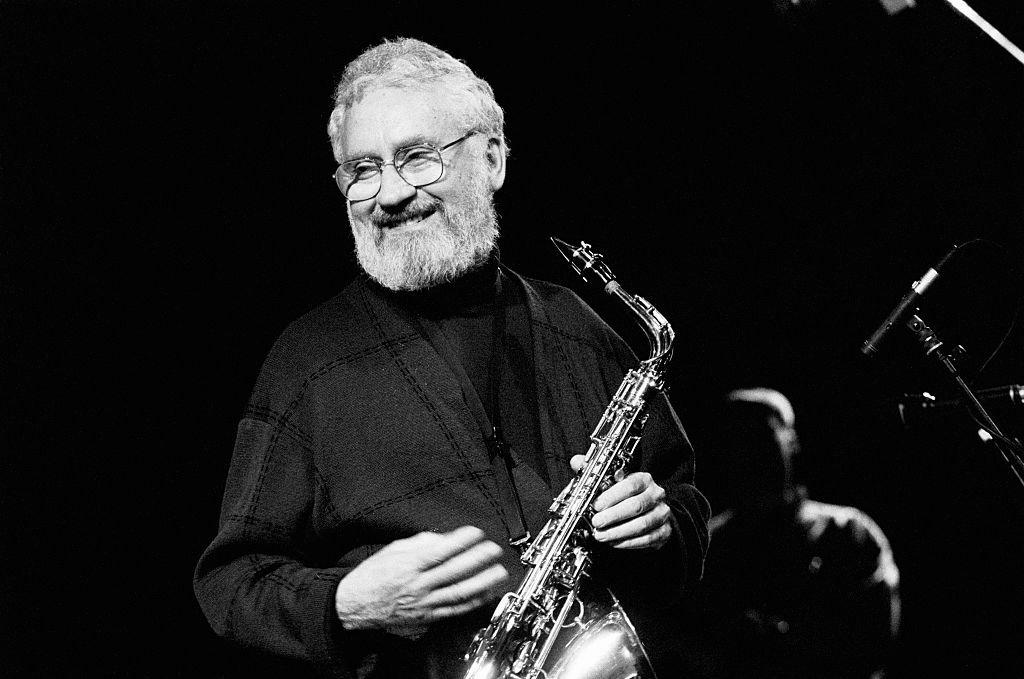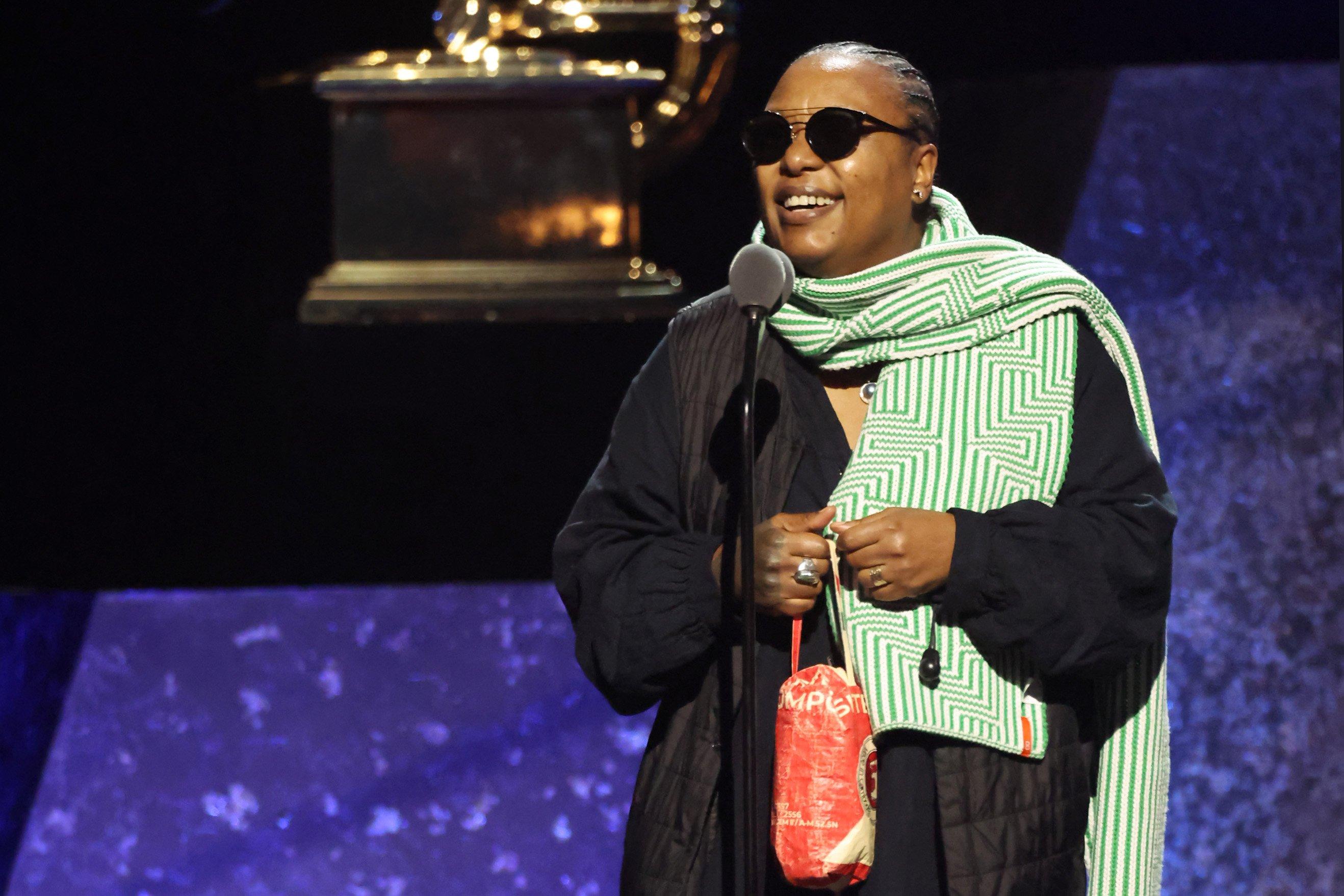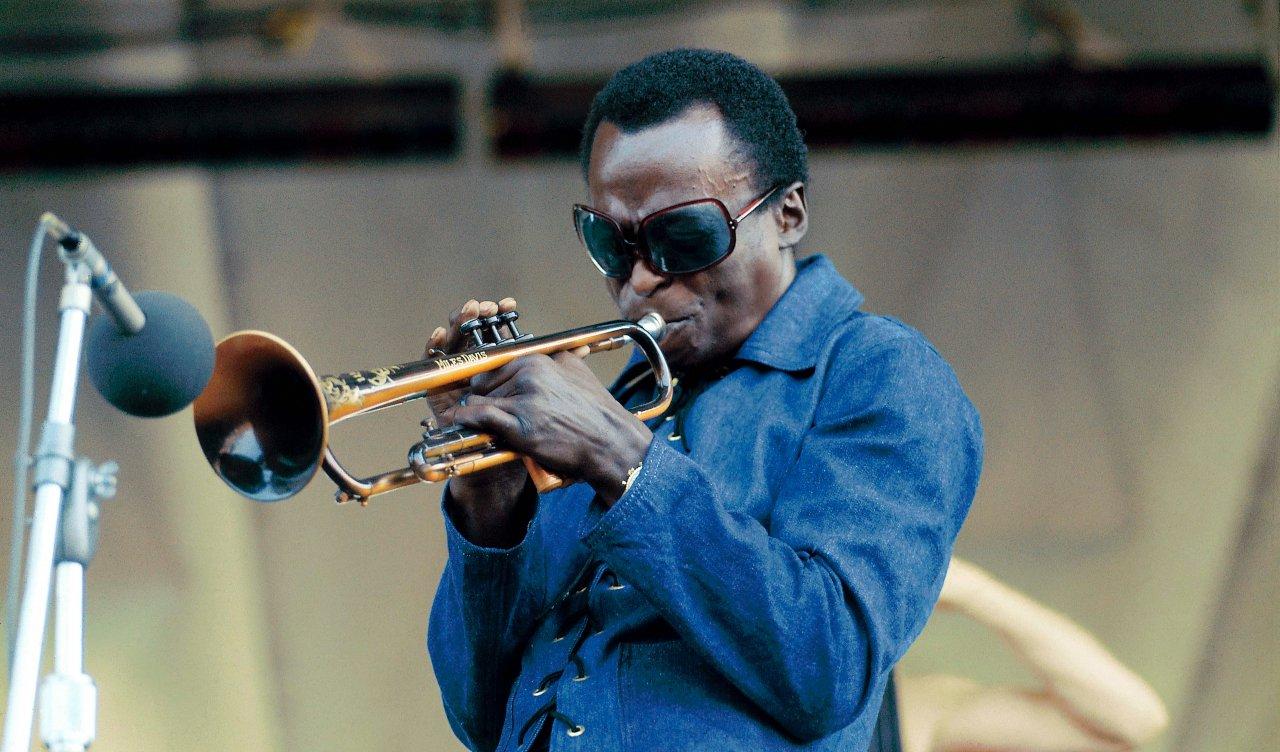Photo: Frans Schellekens/Redferns

Lee Konitz performs in 1992
news
Remembering Jazz Saxophone Legend Lee Konitz, "Cool Jazz" Pioneer And Miles Davis Collaborator
Konitz, who died at 92 due to complications from COVID-19, recorded and featured on several dozens of albums as a leader or sideman alongside many jazz greats
The jazz world lost one of its most revered artists this week (April 15) with the passing of Lee Konitz, the legendary, award-winning composer and saxophonist best known for his pioneering work in the "cool jazz" style as well as his contributions to Miles Davis' Birth Of The Cool sessions between 1949 and 1950.
Konitz, who died in Manhattan at 92 due to complications from COVID-19, held a prolific seven-decade career, which included runs and collaborations with several icons in the jazz world, including Charles Mingus, Dave Brubeck, Chick Corea, Bill Evans, Stan Kenton's Orchestra, Warne Marsh, Lennie Tristano, Bud Powell and several others.
<style>.embed-container { position: relative; padding-bottom: 56.25%; height: 0; overflow: hidden; max-width: 100%; } .embed-container iframe, .embed-container object, .embed-container embed { position: absolute; top: 0; left: 0; width: 100%; height: 100%; }</style><div class='embed-container'><iframe src='https://www.youtube.com/embed//4CXlBvFxbn0' frameborder='0' allowfullscreen></iframe></div>
Born in 1927 in Chicago, Konitz began his jazz journey at a young age. Inspired by early jazz and big band greats like Benny Goodman, he began on clarinet, at age 11, which he traded for a tenor sax and then moved to the alto sax. By 1945, he went pro and began to work with fellow jazz musicians, and future regular collaborators, like Jerry Wald, Tristano, Claude Thornhill and his orchestra, Gil Evans and Gerry Mulligan.
<style>.embed-container { position: relative; padding-bottom: 56.25%; height: 0; overflow: hidden; max-width: 100%; } .embed-container iframe, .embed-container object, .embed-container embed { position: absolute; top: 0; left: 0; width: 100%; height: 100%; }</style><div class='embed-container'><iframe src='https://www.youtube.com/embed//HdP0Xma4pSw' frameborder='0' allowfullscreen></iframe></div>
Between 1949 and 1950, Konitz joined icon Miles Davis and several other musicians in a series of recording sessions, which would later comprise the latter's 1957 compilation Birth Of The Cool, a landmark album in the jazz canon. The album, along with Konitz's unique style, would go on to help establish and define the "cool jazz" sound, a more subdued, lighter take on the genre that broke away from the faster, complex bebop style then dominating the era.
Read: 'Bitches Brew' At 50: Why Miles Davis' Masterpiece Remains Impactful
Lee Konitz (center), alongside Miles Davis and Gerry Mulligan, at the Birth Of The Cool recording sessions in 1949
While Konitz was "influential in the development of the so-called cool school," The New York Times writes, he also varied his style, "from an early unaccompanied saxophone solo album, to post-bop, free improvisations and a string of innovative duets," Billboard notes. Altogether, he recorded and featured on several dozens of albums as a leader or co-leader and sideman, including works with jazz icons as well as non-jazz artists like Elvis Costello; Konitz played on the latter's 2003 album, North.
Like the true jazz serviceman he was, Konitz continued to perform live into his 90s before his passing, The New York Times notes.
Lee Konitz is survived by his five children, three grandchildren and one great-granddaughter.

Photo: Amy Sussman/Getty Images
news
Meshell Ndegeocello Wins The First-Ever GRAMMY For Best Alternative Jazz Album At The 2024 GRAMMYs
Meshell Ndegeocello won the first-ever GRAMMY for Best Alternative Jazz Album. Ndegeocello bested Arooj Aftab, Vijay Iyer and Shahzad Ismaily; Louis Cole; Kurt Elling, Charlie Hunter and SuperBlue; and Cory Henry.
Meshell Ndegeocello won the first-ever GRAMMY for Best Alternative Jazz Album at the 2024 GRAMMYs.
The album bested Arooj Aftab, Vijay Iyer and Shahzad Ismaily's Love in Exile; Louis Cole's Quality Over Opinion; Kurt Elling, Charlie Hunter and SuperBlue's SuperBlue: The Iridescent Spree; and Cory Henry's Live at the Piano.
In her acceptance speech, the two-time GRAMMY winner and 12-time nominee thanked Don Was, the president of Blue Note Records, as well as other colleagues and loved ones — including her two sons. “I hope I haven’t forgotten anybody,” Ndegeocello graciously said at the end, and invoked an elder of the music: “Oliver Lake, this is for you.”
Keep watching this space for more information about the 2024 GRAMMYs!
A Year In Alternative Jazz: 10 Albums To Understand The New GRAMMYs Category

Photo: Shervin Lainez
list
A Year In Alternative Jazz: 10 Albums To Understand The New GRAMMYs Category
"Alternative jazz" may not be a bandied-about term in the jazz world, but it's a helpful lens to view the "genre-blending, envelope-pushing hybrid" that defines a new category at the 2024 GRAMMYs. Here are 10 albums from 2023 that rise to this definition.
What, exactly, is "alternative jazz"? After that new category was announced ahead of the 2024 GRAMMYs nominations, inquiring minds wanted to know. The "alternative" descriptor is usually tied to rock, pop or dance — not typically jazz, which gets qualifiers like "out" or "avant-garde."
However, the introduction of the Best Alternative Jazz Album category does shoehorn anything into the lexicon. Rather, it commensurately clarifies and expands the boundaries of this global artform.
According to the Recording Academy, alternative jazz "may be defined as a genre-blending, envelope-pushing hybrid that mixes jazz (improvisation, interaction, harmony, rhythm, arrangements, composition, and style) with other genres… it may also include the contemporary production techniques/instrumentation associated with other genres."
And the 2024 GRAMMY nominees for Best Alternative Jazz Album live up to this dictum: Arooj Aftab, Vijay Iyer and Shahzad Ismaily's Love in Exile; Louis Cole's Quality Over Opinion; Kurt Elling, Charlie Hunter and SuperBlue's SuperBlue: The Iridescent Spree; Cory Henry's Live at the Piano; and Meshell Ndegeocello's The Omnichord Real Book.
Sure, these were the standard bearers of alternative jazz over the past year and change — as far as Recording Academy Membership is concerned. But these are only five albums; they amount to a cross section. With that in mind, read on for 10 additional albums from 2023 that fall under the umbrella of alternative jazz.
Allison Miller - Rivers in Our Veins
The supple and innovative drummer and composer Allison Miller often works in highly cerebral, conceptual spaces. After all, her last suite, Rivers in Our Veins, involves a jazz band, three dancers and video projections.
Therein, Miller chose one of the most universal themes out there: how rivers shape our lives and communities, and how we must act as their stewards. Featuring violinist Jenny Scheinman, trumpeter Jason Palmer, clarinetist Ben Goldberg, keyboardist and accordionist Carmen Staff, and upright bassist Todd Sickafoose — Rivers in Our Veins homes in on the James, Delaware, Potomac, Hudson, and Susquehanna.
And just as these eastern U.S. waterways serve all walks of life, Rivers in Our Veins defies category. And it also blurs two crucial aspects of Miller's life and career.
"I get to marry my environmentalism and my activism with music," she told District Fray. "And it's still growing!
M.E.B. - That You Not Dare To Forget
The Prince of Darkness may have slipped away 32 years ago, but he's felt eerily omnipresent in the evolution of this music ever since.
In M.E.B. or "Miles Electric Band," an ensemble of Davis alumni and disciples underscore his unyielding spirit with That You Not Dare to Forget. The lineup is staggering: bassists Ron Carter, Marcus Miller, and Stanley Clarke; saxophonist Donald Harrison, guitarist John Scofield, a host of others.
How does That You Not Dare To Forget satisfy the definition of alternative jazz? Because like Davis' abstracted masterpieces, like Bitches Brew, On the Corner and the like, the music is amoebic, resistant to pigeonholing.
Indeed, tunes like "Hail to the Real Chief" and "Bitches are Back" function as scratchy funk or psychedelic soul as much as they do the J-word, which Davis hated vociferously.
And above all, they're idiosyncratic to the bone — just as the big guy was, every second of his life and career.
Art Ensemble of Chicago - Sixth Decade - from Paris to Paris
The nuances and multiplicities of the Art Ensemble of Chicago cannot be summed up in a blurb: that's where books like Message to Our Folks and A Power Stronger Than Itself — about the AACM — come in.
But if you want an entryway into this bastion of creative improvisational music — that, unlike The Art Ensemble of Chicago and Associated Ensembles boxed set, isn't 18-plus hours long — Sixth Decade - from Paris to Paris will do in a pinch.
Recorded just a month before the pandemic struck, The Sixth Decade is a captivating looking-glass into this collective as it stands, with fearless co-founder Roscoe Mitchell flanked by younger leading lights, like Nicole Mitchell and Moor Mother.
Potent and urgent, engaging the heart as much as the cerebrum, this music sees the Art Ensemble still charting their course into the outer reaches. Here's to their next six decades.
Theo Croker - By The Way
By The Way may not be an album proper, but it's still an exemplar of alternative jazz.
The five-track EP finds outstanding trumpeter, vocalist, producer, and composer Croker revisiting tunes from across his discography, with UK singer/songwriter Ego Ella May weaving the proceedings with her supple, enveloping vocals.
Compositions like "Slowly" and "If I Could I Would" seem to hang just outside the reaches of jazz; it pulls on strings of neo soul and silky, progressive R&B.
Even the music video for "Slowly" is quietly innovative: in AI's breakthrough year, machine learning made beautifully, cosmically odd visuals for that percolating highlight.
Michael Blake - Dance of the Mystic Bliss
Even a cursory examination of Dance of the Mystic Bliss reveals it to be Pandora's box.
First off: revered tenor and soprano saxophonist Michael Blake's CV runs deep, from his lasting impression in New York's downtown scene to his legacy in John Lurie's Lounge Lizards.
And his new album is steeped in the long and storied history of jazz and strings, as well as Brazilian music and the sting of grief — Blake's mother's 2018 passing looms heavy in tunes like "Merle the Pearl."
"Sure, for me, it's all about my mom, and there will be some things that were triggered. But when you're listening to it, you're going to have a completely different experience," Blake told LondonJazz in 2023.
"That's what I love about instrumental music," he continued. "That's what's so great about how jazz can transcend to this unbelievable spiritual level." Indeed, Dance of the Mystic Bliss can be communed with, with or without context, going in familiar or cold.
And that tends to be the instrumental music that truly lasts — the kind that gives you a cornucopia of references and sensations, either way.
Dinner Party - Enigmatic Society
Dinner Party's self-titled debut EP, from 2020 — and its attendant remix that year, Dinner Party: Dessert — introduced a mightily enticing supergroup to the world: Kamasi Washington, Robert Glasper, Terrace Martin, and 9th Wonder.
While the magnitude of talent there is unquestionable, the quartet were still finding their footing; when mixing potent Black American genres in a stew, sometimes the strong flavors can cancel each other out.
Enigmatic Society, their debut album, is a relaxed and concise triumph; each man has figured out how he can act as a quadrant for the whole.
And just as guests like Herbie Hancock and Snoop Dogg elevated Dinner Party: Dessert, colleagues like Phoelix and Ant Clemons ride this wave without disturbing its flow.
Wadada Leo Smith & Orange Wave Electric - Fire Illuminations
The octogenarian tumpeter, multi-instrumentalist and composer Wadada Leo Smith is a standard-bearer of the subset of jazz we call "creative music." And by the weighty, teeming sound of Fire Illuminations, it's clear he's not through surprising us.
Therein, Smith debuts his nine-piece Orange Wave Electric ensemble, which features three guitarists (Nels Cline, Brandon Ross, Lamar Smith) and two electric bassists (Bill Laswell and Melvin Gibbs).
In characteristically sagelike fashion, Smith described Fire Illuminations as "a ceremonial space where one's hearts and conscious can embrace for a brief period of unconditioned love where the artist and their music with the active observer becomes united."
And if you zoom in from that beatific view, you get a majestic slab of psychedelic hard rock — with dancing rhythms, guitar fireworks and Smith zigzagging across the canvas like Miles.
Henry Threadgill - The Other One
Saxophonist, flutist and composer Henry Threadgill composed The Other One for the late, great Milfred Graves, the percussionist with a 360 degree vantage of the pulse of his instrument and how it related to heart, breath and hands.
If that sounds like a mouthful, this is a cerebral, sprawling and multifarious space: The Other One itself consists of one three-movement piece (titled Of Valence) and is part of a larger multimedia work.
To risk oversimplification, though, The Other One is a terrific example of where "jazz" and "classical" melt as helpful descriptors, and flow into each other like molten gold.
If you're skeptical of the limits and constraints of these hegemonic worlds, let Threadgill and his creative-music cohorts throughout history bulldoze them before your ears.
Linda May Han Oh - The Glass Hours
Jazz has an ocean of history with spoken word, but this fusion must be executed judiciously: again, these bold flavors can overwhelm each other. Except when they're in the hands of an artist as keen as Linda May Han Oh.
"I didn't want it to be an album with a lot of spoken word," the Malaysian Australian bassist and composer told LondonJazz, explaining that "Antiquity" is the only track on The Glass Hours to feature a recitation from the great vocalist Sara Serpa. "I just felt it was necessary for that particular piece, to explain a bit of the narrative more."
Elsewhere, Serpa's crystalline, wordless vocals are but one color swirling with the rest: tenor saxophonist Mark Turner, pianist Fabian Almazan, and drummer and electronicist Obed Calvaire.
Themed after "the fragility of time and life; exploring paradoxes seeded within our individual and societal values," The Glass Hours is Oh's most satisfying and well-rounded offering to date, ensconced in an iridescent atmosphere.
Charles Lloyd - Trios: Sacred Thread
You can't get too deep into jazz without bumping into the art of the trio — and the primacy of it.
At 85, saxophonist and composer Charles Lloyd is currently smoking every younger iteration of himself on the horn; his exploratory fires are undimmed. So, for his latest project, he opted not just to just release a trio album, but a trio of trios.
Trios: Chapel features guitarist Bill Frisell and bassist Thomas Morgan; Trios: Ocean is augmented by guitarist Anthony Wilson and pianist Gerald Clayton; the final, Trios: Sacred Thread, contains guitarists Julian Lage and percussionist Zakir Hussain.
These are wildly different contexts for Lloyd, but they all meet at a meditative nexus. Drink it in as the curtains close on 2023, as you consider where all these virtuosic, forward-thinking musicians will venture to next — "alternative" or not.

Photo: David Redfern/Redferns/Getty Images
list
5 Less-Discussed Miles Davis Albums You Need To Know, From 'Water Babies' To 'We Want Miles'
Despite not being mentioned nearly as much as 'Kind of Blue' or 'Bitches Brew,' these five albums are highly recommended — some for Davis neophytes, some for diehards.
Joe Farnsworth couldn’t believe what he was watching. The leading straight-ahead drummer was sitting with the revered tenor saxophonist George Coleman, and a Miles Davis documentary happened to come on TV.
“This documentary went from Coltrane straight to Sam Rivers,” Farnsworth told LondonJazz News in 2023 — referring to the tenormen the eight-time GRAMMY winner and 32-time nominee employed in his so-called First and Second Great Quintets, respectively.
“What happened to ‘Four’ & More? What happened to My Funny Valentine? What happened to Seven Steps to Heaven?” Farnsworth remembered wondering. “Not a mention, man.”
Granted, Coleman’s tenure represented a transitional period for Davis’s group; his choice of tenorist would solidify in 1964 with the arrival of the 12-time GRAMMY winner and 23-time nominee Wayne Shorter. With pianist Herbie Hancock, bassist Ron Carter and drummer Tony Williams as the rhythm section — 18 GRAMMYs between them — the result was one of jazz’s all-time classic groups.
But Farnsworth’s point is well taken: in the recorded canon, jazz tends to lionize the rulebook-shredders and boundary-shatterers, at the expense of merely excellent work. But there’s not only room for both; in order to exist, the former requires the latter, and vice versa.
And given that Davis is, in many respects, the quintessential jazz musician, this wholly applies to him and his formidable discography — where the capital-P pivotal ones, like Kind of Blue and Bitches Brew, get the majority of the ink.
After you check out Seven Steps to Heaven and the like — and absorb Coleman’s important contributions to Davis’s story — take a spin through five more Davis albums that deserve more attention.
Water Babies (rec. 1967-1968, rel. 1976)
Axiomatically, anything Davis’ Second Great Quintet — and keyboardist Chick Corea and bassist Dave Holland, to boot — laid to tape is worth hearing.
But Water Babies should be of interest to any serious Miles fan because it reveals the connective tissue between Davis’ acoustic and electric eras.
The first three tracks, “Water Babies,” “Capricorn” and “Sweet Pea” — Shorter compositions all — were retrieved from the cutting room floor circa 1968’s Nerfiti. (Tellingly, that turned out to be Davis’ final fully acoustic album.)
Tracks four and five — “Two Faced” and “Dual Mr. Tillman Anthony” — add Corea and Holland to the mix; on electric piano, Corea adds a celestial drift to the proceedings. For reasons both
Miles in the Sky (1968)
Miles Davis and George Benson on record? It happened — lucky us. The 10-time GRAMMY-winning, 25-time nominated guitar genius can be found on two tracks from the 1979 outtakes compendium Circle in the Round, and on “Paraphernalia” from Miles in the Sky.
While Water Babies is something of a dark horse for the heads, Miles in the Sky — also featuring the Second Great Quintet —is a fleet, aerodynamic stunner and one of the most unfairly slept-on entries in his discography.
Outside of the Shorter-penned “Paraphernalia,” Miles in the Sky features two Davis tunes in “Stuff” and “Country Son,” and a Williams composition in “Black Comedy.”
It’s sterling stuff, right at the tipping point for fusion — and its obfuscation says nothing about its quality, but speaks volumes as to the volume of masterpieces in Davis’ discography.
Agharta (1965) and Pangaea (1976)
Two primo dispatches from Davis’ experimental years, capturing two concerts from the same evening in Osaka, Agharta and Pangaea are amoebic, undulating wonders.
Across the nearly 100-minute Agharta and 88-minute Pangaea, Davis and company — including alto and soprano saxophonist Sonny Fortune, and guitarists Reggie Lucas and Pate Cosey — conjure everything we expect from electric Miles.
Abstracted drones, worldbeat textures, Davis’ trumpet funneled through twisted wah-wah: check, check, and check. One critic characterized the music as “ambient yet thrashing,” compared it to “Fela Kuti jamming with Can,” and identified hints of Stockhausen, and nailed it on all three counts.
Fans of thick, heavy, electrified Miles typically reach for Bitches Brew or On the Corner first. But if those don’t completely whet your thirst, there’s a whole lot where that came from.
And given that Davis put down the horn, ravaged by illness, for six years afterward, Agharta and Pangaea represent something of a culmination of Davis as the intrepid deconstructionist.
We Want Miles (1982)
Despite what you may have heard, ‘80s Miles — his final full decade on earth, and the one where he drew heavily from pop sounds and songs — is nothing to sniff at.
From 1981’s The Man with the Horn to 1983’s Star People to 1989’s Aura, Davis produced a number of rough-hewn gems. And despite Davis’ bulldozed health during its recording, the live We Want Miles, recorded in ‘81, is among them.
Despite requiring oxygen between songs and wearing a rubber corset to keep playing, Davis is in fine form.
Plus, he’s flanked by heavyweights, from saxophonist Bill Evans (no, not that Bill Evans) to six-time GRAMMY-nominated guitarist Mike Stern and two-time GRAMMY-winning bassist Marcus Miller.
We Want Miles proves that Miles never lost his ability to produce inspired, inspiring work — no matter what his failing body or, erm, ‘80s textures threw at it.
Davis passed away in 1991, and we’ll never see his like again — so savor everything he gave us, whether illuminated or obscured by shadow.
Bird And Diz At 70: Inside Charlie Parker & Dizzy Gillespie's Final Studio Date — An Everlasting Testament To Their Brotherhood

Photo: Jeff Kravitz/FilmMagic
video
GRAMMY Rewind: Kendrick Lamar Honors Hip-Hop's Greats While Accepting Best Rap Album GRAMMY For 'To Pimp a Butterfly' In 2016
Upon winning the GRAMMY for Best Rap Album for 'To Pimp a Butterfly,' Kendrick Lamar thanked those that helped him get to the stage, and the artists that blazed the trail for him.
Updated Friday Oct. 13, 2023 to include info about Kendrick Lamar's most recent GRAMMY wins, as of the 2023 GRAMMYs.
A GRAMMY veteran these days, Kendrick Lamar has won 17 GRAMMYs and has received 47 GRAMMY nominations overall. A sizable chunk of his trophies came from the 58th annual GRAMMY Awards in 2016, when he walked away with five — including his first-ever win in the Best Rap Album category.
This installment of GRAMMY Rewind turns back the clock to 2016, revisiting Lamar's acceptance speech upon winning Best Rap Album for To Pimp A Butterfly. Though Lamar was alone on stage, he made it clear that he wouldn't be at the top of his game without the help of a broad support system.
"First off, all glory to God, that's for sure," he said, kicking off a speech that went on to thank his parents, who he described as his "those who gave me the responsibility of knowing, of accepting the good with the bad."
Looking for more GRAMMYs news? The 2024 GRAMMY nominations are here!
He also extended his love and gratitude to his fiancée, Whitney Alford, and shouted out his Top Dawg Entertainment labelmates. Lamar specifically praised Top Dawg's CEO, Anthony Tiffith, for finding and developing raw talent that might not otherwise get the chance to pursue their musical dreams.
"We'd never forget that: Taking these kids out of the projects, out of Compton, and putting them right here on this stage, to be the best that they can be," Lamar — a Compton native himself — continued, leading into an impassioned conclusion spotlighting some of the cornerstone rap albums that came before To Pimp a Butterfly.
"Hip-hop. Ice Cube. This is for hip-hop," he said. "This is for Snoop Dogg, Doggystyle. This is for Illmatic, this is for Nas. We will live forever. Believe that."
To Pimp a Butterfly singles "Alright" and "These Walls" earned Lamar three more GRAMMYs that night, the former winning Best Rap Performance and Best Rap Song and the latter taking Best Rap/Sung Collaboration (the song features Bilal, Anna Wise and Thundercat). He also won Best Music Video for the remix of Taylor Swift's "Bad Blood."
Lamar has since won Best Rap Album two more times, taking home the golden gramophone in 2018 for his blockbuster LP DAMN., and in 2023 for his bold fifth album, Mr. Morale & the Big Steppers.
Watch Lamar's full acceptance speech above, and check back at GRAMMY.com every Friday for more GRAMMY Rewind episodes.
10 Essential Facts To Know About GRAMMY-Winning Rapper J. Cole
